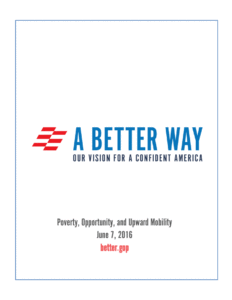 Here’s a relatively safe policy prediction: We will get major Federal corporate tax reform in the next year. Here’s a sneak preview of that reform, especially the parts that I like. Other parts I think are kooky or wrong, but for that critique you’ll have to wait for a few more days.
Here’s a relatively safe policy prediction: We will get major Federal corporate tax reform in the next year. Here’s a sneak preview of that reform, especially the parts that I like. Other parts I think are kooky or wrong, but for that critique you’ll have to wait for a few more days.
Normally I’d recommend ignoring policy wonk papers published many months ago back in the midst of a Presidential campaign. However, with a House, Senate, and Executive branch unified under the same party, much of this stuff in Paul Ryan’s June 2016 proposal known as “A Better Way” (aka “the Blueprint”) will likely become law.
Before you decide to ignore tax reforms to focus on the sick Twitter burns, “alternative facts,” and the claims and counterclaims of “Fake News,” let me just stake the claim that tax law is the hidden architecture of our world. This, right here, is the stuff that really matters. Mike’s Second Immutable Law of Taxation states that if you want to know what a society’s real values are, follow its tax laws. (I’ll remind you of Mike First Immutable Law a little later on.)
According to Ryan’s “A Better Way,” the goals of corporate tax reform are:
- Spur additional capital investment in the US
- Discourage corporate indebtedness
- Reduce corporate “double-taxation” of profits
- Bring US tax rates in line with international tax rates
- Simplify the cost of tax compliance with the IRS
- Improve the IRS’s customer-service orientation, and
- Reduce the stockpile of overseas corporate profits held by US companies.
All of these sound like reasonable goals to me.
 To spur business investments, the Blueprint recommends allowing businesses to deduct the full cost of purchasing tangible and intangible assets in the year purchased. Previously, when a business invested in a thing – Iike, I don’t know, let’s say a new tractor – the business would depreciate, or spread out over time, the cost of the tractor, over many years. The effect is to give businesses an additional tool for reducing their current tax bills. That seems like it probably would help spur more business investment.
To spur business investments, the Blueprint recommends allowing businesses to deduct the full cost of purchasing tangible and intangible assets in the year purchased. Previously, when a business invested in a thing – Iike, I don’t know, let’s say a new tractor – the business would depreciate, or spread out over time, the cost of the tractor, over many years. The effect is to give businesses an additional tool for reducing their current tax bills. That seems like it probably would help spur more business investment.
To further help businesses, and to bring US taxes in line with international rates, the Blueprint proposes a drop from a top (C-Corp) corporate tax rate of 35% to a far more modest 20% flat rate, and a drop to 25 percent for sole proprietorship and partnerships, which make up most small businesses. Before you angrily shout “Corporate give-away!” let me make the case for this one.
The justification for this drop has many parts. First, the average corporate tax rate of developed countries is 24.8 percent, far below the US, which has the highest top corporate tax rate among our peer group countries. Ironically, the US also collects proportionately less corporate taxes than peer group countries. So, we have high tax rates, but low tax collection – a bad combo.
Now, our current top corporate tax rate of 35 percent – compared with the average of roughly 25 percent elsewhere – probably overstates the differences. That’s because corporations in other countries may pay fees and licenses and other taxes that US corporations do not, and also because large US corporations are skilled at tax avoidance strategies. We should expect that skilled tax avoidance because of Mike’s First Immutable Law of Taxation, which states that “every tax action causes an opposite tax-avoidance reaction.” Understanding that immutable law, we should favor tax rates that cause the least amount of tax avoidance behaviors.
A main justification for the corporate tax rate drop is to bring us in line with international tax norms. Why should we care about that? First, because in an interconnected world, US corporations operate at a competitive disadvantage under their higher tax rate.
Second, US multinationals have figured out that they can avoid being taxed on overseas profits at our more punitive 35 percent rate by one of two methods. The first method is that some corporations leave their money earned overseas in a kind of international tax limbo. The result is an estimated $2 trillion in untaxed US corporate earnings held overseas. Large corporations have been waiting for tax rates to drop, as now seems imminent, or for a kind of one-time corporate tax amnesty to incentivize them to onshore their profits. This all seems much more likely to happen with upcoming tax reform, and will also give a one-time boost to the US Treasury.

Other companies have decided to merge with – or be bought by – foreign corporations in order to avoid US tax rates, in what’s called a “tax inversion.” Burger King famously did this with Canadian-based firm coffee chain Tim Hortons. Minnesota-based Medical device giant Medtronics was ‘bought’ by Ireland-based Covidien, a smaller medical device company that allowed the US company to relocate to a lower-tax country.
From my perspective, you really can’t blame the leaders of corporations for doing either of these things, when faced with a massive corporate tax rate difference. In order to be responsive to shareholders, top executives have to seek legal ways to minimize their taxes. All of which is to say, bringing top US corporate tax rates closer to international norms seems like an important and overdue reform.
To discourage corporations from taking on debt, the Blueprint proposes eliminating the tax deduction for paying interest on debt. The household analogy here would be the popular mortgage interest tax deduction, which somewhat encourages homeowners to take on larger mortgages than they might otherwise take on, which is also something I kind of hate. The idea in the corporate world is that by eliminating deductions for debt interest payments, corporations will be nudged into taking on less debt. In addition, the Blueprint argues, this elimination, paired with the upfront deduction for capital investments described above, encourages current investment, but not through excessive borrowing.
Finally, the Blueprint proposes modernizing and streamlining the IRS. This seems like one of those things that’s easier said than done, but by all means, let’s try to make this happen as well.
I have plenty of mean things to say about other aspects of the Blueprint tax reform, but I’ll save that for a future post.
A version of this ran in the San Antonio Express News and Houston Chronicle.
See related posts:
How to Evade Taxes Offshore – Wyly Style
Taxes and the Carried Interest Loophole
Real Estate Tax RantThe Problem of Tax Code Complexity
Adult Conversation about Income Taxes
Post read (233) times.
